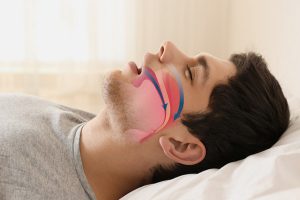Wow, great experience having my wisdom teeth removed which I never thought I’d ever say. Clinic was very organized, all the staff I dealt with was very friendly and helpful, and the extraction and aftercare was excellent. I’d get my teeth removed there again if I could! Very happy!
Trouble Sleeping, Snoring, or Waking Up Tired? It Could Be Sleep Apnea.
If you’ve been told you stop breathing while you sleep—or you wake up gasping, snoring loudly, or feeling exhausted—you may have Obstructive Sleep Apnea (OSA). This condition causes repeated interruptions in airflow during sleep and can affect everything from your energy and focus to your heart health.
At Airdrie Oral Surgery, we work with patients whose OSA hasn’t improved with traditional treatments like CPAP. If you’re exploring surgical options, we’re here to help.
What Is Obstructive Sleep Apnea?
OSA occurs when soft tissues in the throat (often the tongue) block your airway while you sleep. This prevents air from reaching the lungs and leads to:
- Low oxygen levels
- Brief awakenings (sometimes unnoticed)
- Loud snoring or gasping
- Interrupted, poor-quality sleep
Over time, OSA can contribute to:
- Daytime fatigue or brain fog
- Irritability or mood swings
- High blood pressure or heart problems
- Difficulty concentrating or memory issues
How Is It Diagnosed?
Diagnosis starts with recognizing symptoms like:
- Loud snoring
- Waking up feeling tired or with a dry mouth
- Morning headaches
- Trouble staying awake during the day
At your consultation, we’ll:
- Review your sleep history and symptoms
- Use 3D imaging (CBCT scan) to evaluate your airway
- Refer you for a sleep study if needed
- Coordinate with your sleep specialist or medical doctor as part of your care team
What Are the Treatment Options?
Many patients start with CPAP therapy, which delivers continuous air pressure through a nasal mask. But if CPAP doesn’t work or isn’t well tolerated, surgery may be recommended.
Jaw Surgery for Sleep Apnea (Maxillomandibular Advancement)
Surgical treatment may involve moving the upper and lower jaws forward to enlarge the airway and improve airflow during sleep. This is known as maxillomandibular advancement and is typically performed in a hospital setting.
- Done under general anesthesia
- Usually involves a 1–2 day hospital stay
- Increases airway space permanently
- Can dramatically improve breathing and sleep quality
- May reduce or eliminate the need for CPAP
Why It Matters
Sleep apnea doesn’t just affect your sleep—it affects your brain, heart, and overall quality of life. If non-surgical treatments haven’t helped, surgery could offer a permanent solution with long-term health benefits.
Want to Read More?
Visit the Calgary Oral Surgery Group’s Sleep Apnea Page for more details on the diagnosis and surgical process.
Let’s Talk
If you’re ready to explore surgical options for sleep apnea, contact Airdrie Oral Surgery to book your consultation. We’ll help you understand your airway, explore treatment options, and find the path to better sleep and better health.

